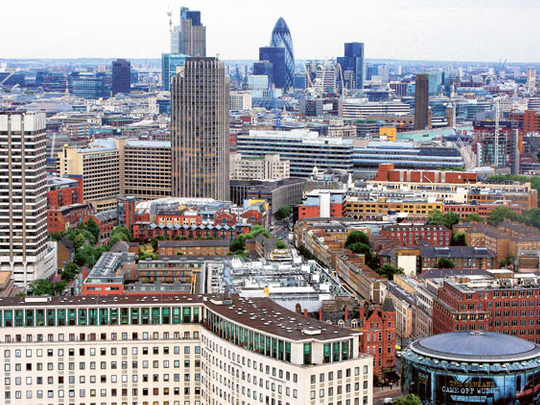
London: UK commercial property values probably will fall by 4.9 per cent next year as the European debt crisis and concern that Britain may slip back into recession hurts demand for assets in all but the best locations.
Six economists, analysts and executives surveyed by Bloomberg News all predicted a decline in 2012. Prices tracked by Investment Property Databank fell last month for the first time since July 2009. The biggest drop estimated was seven per cent and the smallest was 2.5 per cent.
"Businesses are not feeling confident," said Ed Stansfield, chief property economist at London-based Capital Economics Ltd. "They're not investing, they're not employing, none of which is good news for the commercial property sector."
A two-year recovery in values for UK shops, offices and warehouses petered out in the second-half of this year as efforts to shore up the finances of countries such as Greece, Spain and Italy failed to stem rising government borrowing costs.
The British economy has a 50 per cent chance of slipping back into recession next year, the National Institute for Economic and Social research said last month.
The average value of UK commercial real estate declined 0.02 per cent in November from October, IPD said on December 14. Values fell 44.1 per cent from June 2007 to June 2009 and then rose by 17.9 per cent in the following months through November.
A forecasting model used by IPD suggests the market will fall by slightly more than four per cent in 2012 before rising by less than 0.5 per cent the next year, said Malcolm Hunt, the data company's client services director for the UK and Ireland.
Avoiding risk
In periods of economic uncertainty, investors and tenants tend to focus on buildings in the best locations "and away from the secondary, more risky areas of the market," Hunt said.
Non-prime asset prices are under pressure as lenders such as Lloyds Banking Group and Royal Bank of Scotland seek to reduce their loan books by selling repossessed real estate or portfolios of loans.
Also about £4.8 billion of loans linked to commercial mortgage backed securities are due to mature next year, Standard & Poor's wrote in a November 30 report. That means the loans must be refinanced or the assets backing the commercial securities must be sold.
There's a mismatch between the "pretty poor quality" assets backing bank loans coming due and the kind of properties sought by those with cash to invest, Stansfield said.
Insurance companies and pension funds entering the real estate lending market only want to fund "high quality assets in prime and near-prime locations," he said.
UK real estate investment trusts with high-quality assets will benefit from that preference, said Sue Munden, an analyst at investment bank Seymour Pierce Ltd. "The good are going to continue getting better and the bad are going to carry on getting worse," she said.
Rich get richer
Munden predicted that other property companies will follow Derwent London in issuing convertible bonds as an alternative to bank financing. The value of larger UK property companies such as Land Securities may increase by 20 per cent next year, leaving them trading at a discount of about 10 per cent to net asset value, said JPMorgan Chase & Co. analyst Harm Meijer.
Munden is advising clients to focus on companies with assets in London such as Shaftesbury.
"In order for rents to rise, you need the economy to be positive, to have GDP growth, and London is probably the only area in the UK that has remained buoyant," she said.
Retail is the weakest area of the market and IPD expects that to remain the case until 2013, according to Hunt.
Stansfield said Capital Economics currently prefers warehouses. "There's a marginal preference for the industrial sector," he said. "It's not a positive bias in favour of it, it's rather that it's the best of a bad job."
The market may also see more publicly traded real estate companies being targeted by for takeovers, said Meijer of JPMorgan. "We wouldn't be surprised if an overseas Reit comes sniffing around. The UK small caps look pretty vulnerable."
He predicted that values will fall by 3.5 per cent by the middle of next year, with non-prime assets dropping the most. Development Securities Chief Executive Officer Michael Marx predicted a drop of as much as five per cent in the first half, with a possible rebound cutting the decline to zero to 2.5 per cent for the full year. Stansfield estimated a five per cent decline for 2012.
UK commercial properties are still more than a third cheaper than they were at the peak of the market, said Hunt at IPD.
"Although we've talked about the end of a recovery, we're still a long way shy of where we were."
€100 tax on household
Ireland's government, which will levy a €100 household charge on homes next year, is setting up an expert group to advise on potentially bringing in a "fair, progressive" property tax system "sooner rather than later," according to an environment ministry spokeswoman.
"The government has continued to say that the household charge is an interim measure only," said the spokeswoman Yvonee Hyland.
While Ireland has agreed under the terms of its bailout to introduce a graduated system of property tax in 2014, such a charge is likely to come in a year earlier, the Irish Times had reported.











